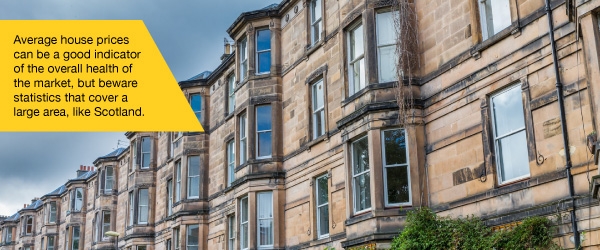
With reports in the media this month that average house prices in Scotland are growing at the longest sustained rate for four years, we thought we would examine ‘average house price’ surveys and the house price reports that lie behind these regular Press reports. So, can you trust house price surveys? Where do they get their ‘averages’ from? And, if these are all ‘facts’, why do they all differ?
An STV report showed that the average property price in Scotland was £161,402 and that the average price was up 4% compared with last year and up 0.3% on the level recorded in March. This story was in turn based on figures from LSL, the umbrella company that owns a number of estate agents, surveyors and other property services throughout the UK. Beyond that, it’s not actually clear where those figures come from. With so many house price reports bandied-about in the Press, how do you know which ones to pay attention to and which ones to trust? We thought that we would take a closer look at what these house price surveys mean and which ones you should pay attention to!
There are a number of regular house price reports that are released on a regular basis. So first of all, where do ‘average’ house price statistics come from?
Mortgage Data
Some of these are based on mortgage data: reports released by Halifax, for example, are based on the value of the mortgages that they alone approve, so these do not include cash sales or sales where mortgages have been approved by any other providers.
Land Registry
Land Registry figures show the actual prices that properties were sold for. This is reliable data, but there is a slight delay in this information becoming available: the property usually shows in the Land Registry several weeks after the sale was concluded.
Chartered Surveyors
The Royal Institute of Chartered Surveyors (RICS) releases figures based on information from their estate agent and chartered surveyor members. In certain geographic areas, where solicitor estate agents are the most common way of marketing properties, the RICS data might not be very representative.
Property Websites
Rightmove, the UK’s largest property website ‘portal’, for example, releases data that focuses on movements in property asking prices rather than selling prices. This is a good measure of optimism amongst property sellers or estate agents, but there’s a big difference between asking for more money and actually achieving it!
As you can see, house price data is gathered from a number of different places and in a number of ways and there are far more surveys and sources even than we have mentioned above!
Averages Can lie, Especially If Your House Isn’t Average
An average, as we all know from our school days, is calculated by adding together all of the available information and then dividing it by the total. So if 650 homes were sold in May, the total value of these homes would be added together and then divided by 650 to come up with the average.
The problem with this is that it smooths the data out so much that it becomes meaningless if you are looking for specific information about how the market is looking for your own property.
In UK-wide house price reports, the whole of Scotland is often considered to be a ‘region’ i.e. ‘the average price in Scotland rose by 5%’. This approach obviously fails to take into account the massive variations that occur from one area to the next. Property prices in Aberdeen will no doubt be performing in a very different way to those in Dunfermline, Melrose or Edinburgh. For instance the latest ESPC house price report shows the average property price in Edinburgh to be £212,431, considerably higher than that of Scotland as a whole (http://www.espc.com/news/espc-house-price-report-may-2014).
If you drill-down even further, property in the Trinity area of Edinburgh will be experiencing different trends from property in Gorgie. So, yes, average house prices rising consistently over eight consecutive months does seem to be good news for the property market overall, but it doesn’t give you an idea of how your own property will perform should you put it on the market.
Variations also occur by the type of property. For instance the demand for one bedroom flats can vary significantly to that of four bedroom Georgian townhouses. Cash buyers who are looking for their next family home will not be subject to the same restrictions as first time buyers who are relying on mortgage lending for instance. The law of supply and demand will also play a large part in the price that your property can command: if it is in short supply with lots of potential buyers, such as the market for relatively affordable, relatively central family homes in Edinburgh, the ‘average’ movements in property prices simply won’t apply.
The Big Question Therefore Is: Should You Pay Attention to Average House Prices at All Then? The Answer is ‘Yes’, but With a Huge Dose of Caution!
Average house prices can be a good indicator of the overall health of the market, but beware particularly of statistics that cover a large area such as the whole of Scotland or indeed the whole of the UK. It is far more useful to look at data gathered from smaller areas and broken down by type of property so you can more easily compare this with your own property. Your estate agent or solicitor should also be able to give you a more accurate outlook for your property based on their market knowledge and experience.
If you are thinking of selling and would like to know what your property may be worth, or would like to know if the stats that you have been reading recently about the property market as a whole apply to your own property, contact us now for a free valuation or pre-marketing appraisal!
















